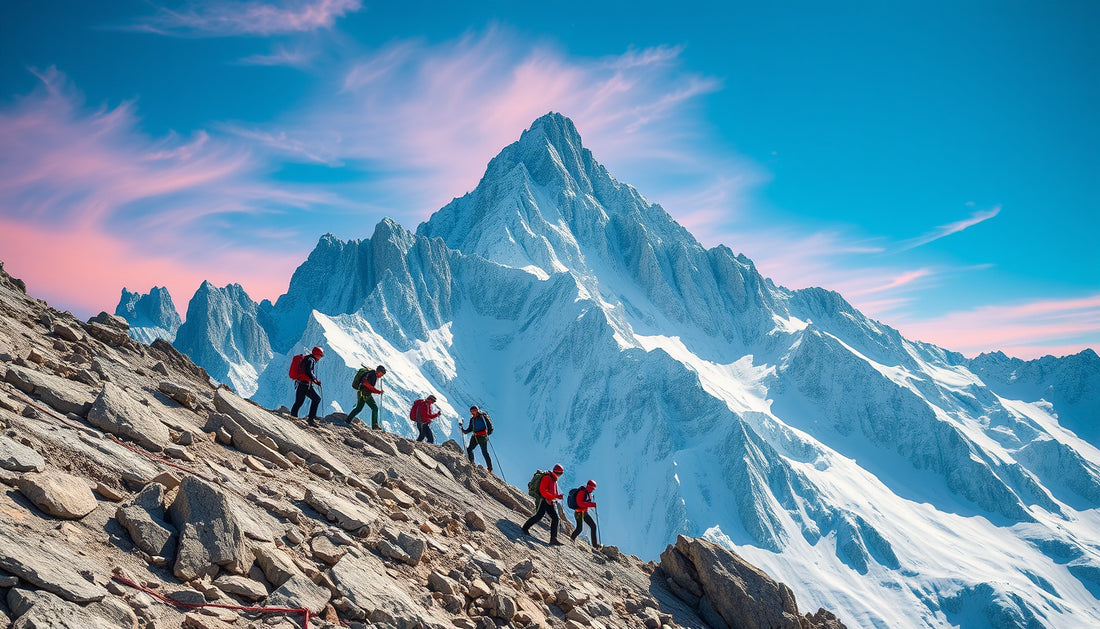
Conquer the Peaks: Essential Mountaineering Tips from Expert Guides for Your Next Adventure
Share

Venturing into the mountains offers an unparalleled blend of adventure, challenge, and awe-inspiring beauty. Whether you are an aspiring mountaineer planning your first ascent or an experienced climber seeking to refine your skills, expert guidance is invaluable. Professional guides bring a wealth of experience and knowledge that can make the difference between a successful climb and a hazardous journey. In this blog, we delve into essential mountaineering tips from seasoned guides designed to elevate your next mountain adventure.
Who Is This Guide For?
- Novice climbers eager to learn foundational skills
- Experienced mountaineers looking to enhance safety and technique
- Outdoor enthusiasts with a passion for mountain exploration
- Group leaders and organized expeditions seeking best practices
The Mountaineering Challenge: Why Preparation Matters
Mountains are magnificent yet unforgiving. Unpredictable weather, technical terrain, and physical demands require climbers to be thoroughly prepared. As mountaineering expert and IFMGA-certified guide Renato Regenass states:
“Mountaineering is about managing risk intelligently, not eliminating risk entirely.”
By integrating expert advice, you can anticipate and mitigate many common hazards.
Essential Tips from Professional Mountaineers
1. Prioritize Physical and Mental Conditioning
Physical fitness is fundamental, but mental resilience is equally critical. Climbers face fatigue, altitude, and stressful conditions that require endurance.
- Engage in cardiovascular training (e.g., running, cycling)
- Incorporate strength training focusing on core and legs
- Practice mindfulness techniques to maintain focus and calm under pressure
Quote: “A strong mind can push the body beyond perceived limits.” — Sarah Thompson, Alpine Guide
2. Master the Art of Planning and Route Selection
Preparation isn’t just packing gear — it’s knowing your route intimately.
- Study topographic maps and recent trip reports
- Monitor weather forecasts regularly and be prepared to adjust plans
- Identify key landmarks, potential hazards, and escape routes
3. Invest in High-Quality, Appropriate Gear
Equipment can’t substitute skill, but it can save lives and enhance safety.
- Choose footwear suited for the terrain (e.g., crampons, waterproof boots)
- Layer clothing for variable mountain climates
- Use a reliable navigation system (GPS plus map and compass)
4. Learn and Practice Technical Skills
From rope management to crevasse rescue, technical expertise is a must.
- Enroll in mountaineering courses or guided expeditions
- Regularly practice knots, belaying, and ice axe techniques
- Understand self-arrest methods and glacier travel protocols
5. Respect Weather and Elevation Acclimatization
Weather in mountainous regions can change rapidly and dramatically. Also, getting used to high altitude protects against acute mountain sickness (AMS).
- Ascend gradually to allow physiological adaptation
- Stay hydrated and avoid excessive exertion in early phases
- Always carry emergency shelter and weather-appropriate equipment
6. Foster a Team-Oriented Mindset
Many accidents occur due to poor communication or group dynamics.
- Establish clear signals and decision-making protocols
- Monitor fellow climbers for signs of fatigue or distress
- Share responsibilities like navigation and gear checks
Statistics That Highlight the Importance of Expert Preparation
- According to the American Alpine Club, nearly 70% of accidents on technical climbs involve human error
- Proper acclimatization reduces the incidence of altitude sickness by up to 60%
- Studies show that guided expeditions have a 40% lower incidence of serious injuries compared to unguided climbs
Why Learn From Experts?
Professional guides have climbed thousands of routes, refined their skills through rigorous training, and constantly update their knowledge on mountain conditions and safety. Their insights turn abstract knowledge into practical strategies.
As renowned mountaineer and expedition leader Ed Viesturs expressed:
“Getting to the summit is optional; getting down is mandatory.”
This highlights the critical importance of safe climbing practices taught by professionals.
Conclusion: Your Next Steps to Mountain Mastery
Are you ready to embrace the call of the mountains with confidence and responsibility? Start by incorporating these expert tips into your preparation. Consider joining guided expeditions or investing in formal mountaineering training to deepen your experience.
Remember: every summit is earned through preparation, respect for nature, and skillful execution.
Call to Action:
Ready to conquer your next peak? Connect with certified mountaineering guides or enroll in a course today. Equip yourself with knowledge, train smartly, and discover the true beauty and challenge of the mountains safely. Your adventure awaits!






